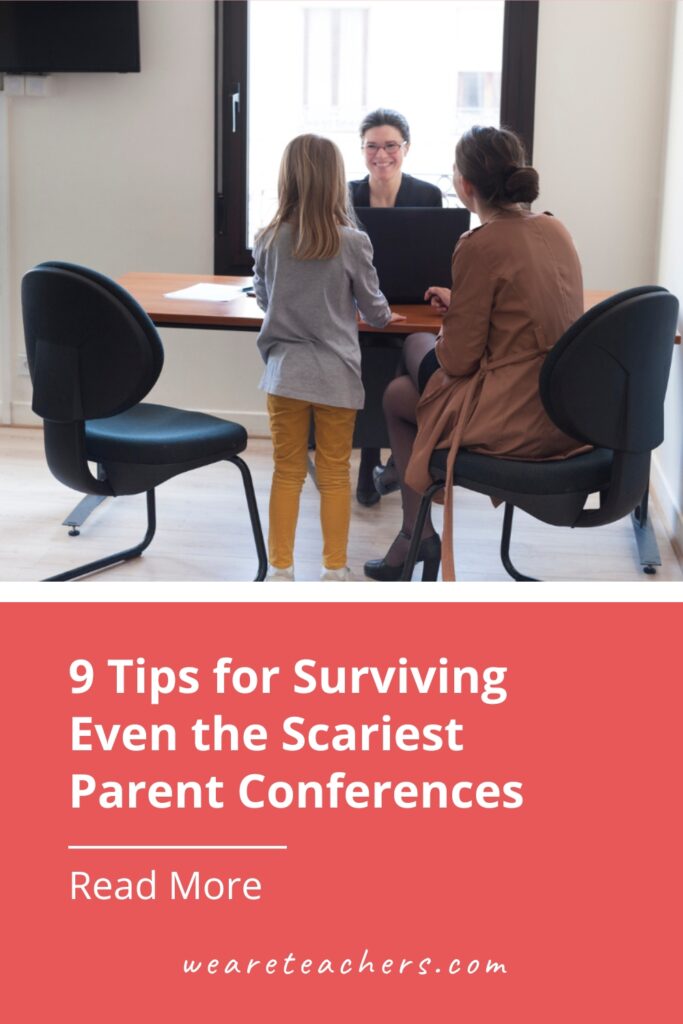We’ve all been there. At some point, even the most angelic and perfect teachers among us (not including myself here) end up with a parent conference on their calendar that makes them want to hide under their desks.
I am, of course, not talking about all parent conferences. We are happy to meet with parents who approach teachers with questions instead of accusations; with an attitude of partnership instead of adversity. When parents come with a vibe that says, “Can you help me?” or “Can we work on this together?” it sets everyone at ease.
When I talk about scary conferences, I’m talking about meeting with parents who have already turned fear about their child’s success (a totally valid emotion) into hostility and blame. The parents who have already set a tone—either via email or phone—that they’re here to tell you how to do your job. The parents who resort to eye-rolling, raising their voice, and other defensive responses.
They are scared. And instead of admitting that, they create scary meetings.
I’m lucky that I’ve had almost exclusively positive interactions with parents. But that doesn’t mean I’ve never sat through a scary one. Going to a parent conference where you know the parents are aggressively unhappy with you can be one of the scariest teacher feelings, especially for new teachers.
Whether you currently have one on your calendar or not, here are my and other teachers’ best tips for surviving—and, dare I say, thriving in?—your next scary conference.
1. Dress professionally.
Should the respect of parents be contingent on our physical appearance? No.
Are we better teachers if we wear skirts or suits instead of jeans? Absolutely not.
Were parents always nicer to me when I had a blazer on and a fresh manicure? Yes.
When I recommend dressing professionally, I’m not talking about fancy name brands or expensive new purchases. Just make sure this isn’t the day you’re wearing your most casual outfit. You want your appearance to say, “I am a professional worthy of respect,” not “I have just come from the faculty vs. students volleyball game and my sweat has bled through my homemade blue-and-purple tie-dyed headband and leaked onto my forehead and eyes, which is why I appear to be both sweaty and also dead.” I may know this from experience.
2. Agree on an agenda and time window before the meeting.
Doing this does two things. First, it invites the parents to be a part of the process and makes sure they know their voice matters. This can go a long way in easing tensions. Second, if you do have an emotionally charged meeting, it gives you time to decompress before you have to go back to the classroom.
PRO TIP: You do not have to make your meeting last an entire planning period or “until school starts.” Always give parents a window that ends 10 minutes before you have to be around kids. Also, if you schedule a conference for after school, still provide a definite ending time!
3. Don’t come empty-handed.
Bring anything that might help you tell their child’s academic, social, or behavioral story lately, which could include:
- Printed email communication with parent (and in some cases with older kids)
- Progress reports, report cards, and any other relevant data
- Work samples, including comparative samples from class with names redacted
- Any behavior documentation you’ve been keeping
- Rubrics, syllabi, or other documents that outline expectations
In addition to these documents, you’ll want to have certain supplies available:
- A notepad and pen to take notes (see my next piece of advice)
- Extra paper and pen if the parent wants to take notes
- Kleenex for any parties that might wind up crying
- A timer or phone alarm you can set to be sure you stick to the time window
4. Bring a third party.
You don’t have to do this for every parent conference, but it’s a good idea to bring a fellow teacher or administrator if you have a suspicion that things might get heated or misunderstood. Let the parent know that the staff member is there to take notes that you will then type up and send to them post-conference. Plus, parents tend to be on better behavior when they know their words and actions are being recorded.
5. Think about what you’d be willing (and not willing) to agree to.
Often we come into a meeting ready to throw down what we won’t do. But equally important is knowing ahead of time what you are willing to do. Is there a tutorial schedule you could agree to? What if the parents ask for you to sign the student’s planner/homework folder? Would you be willing to start writing a weekly newsletter for a bit more transparency? Figuring out in advance what you are willing and not willing to do helps because you will have a firm, confident answer ready.
If parents want you to agree to something you’re not willing to do, don’t feel like you have to comply. “I see why that would be helpful—let me check with my assistant principal and get back to you.”
6. Set a positive tone for the meeting.
It’s very hard for parents to take any kind of advice from someone if they believe you don’t like or at least understand their child. Start the meeting by assuring parents you see and appreciate their child, and that you want the same things for their child that they do.
Start with genuine and thoughtful strengths, including specific anecdotes if you can. Then, establish a common goal by saying, “What are you hoping to get out of today’s meeting? I think it’s important to acknowledge that we both want for Anna to be successful and have a great experience in sixth grade. Let’s talk about how we can work as a team to get there.”
7. Keep your cool.
It will be a lot harder for parents to be mean to you if you are unshakably calm. In the same way that you hand over your power to students by yelling or saying something inflammatory, make sure that you don’t give parents the satisfaction of knowing they’ve unnerved you, whether it’s something you say out loud or it’s in your body language. Check out how principals keep their cool in tough conversations.
PRO TIP: If they can’t keep their cool and they resort to abusive speech or behavior, say, “Out of concern for our productivity, I’m choosing to end our meeting for today. I will email you with next steps.” Then let an administrator know what happened ASAP.
8. Look for opportunities to agree.
It can be hard, but try to find places in the conversation to let the parents know you agree, even if you’re just saying, “That’s a great question” or “I’m so glad you asked that.” This indicates that 1) you are listening and 2) that you are cooperative, and hopefully the other participants in the conversation will follow your lead.
Now, here’s the thing with a disagreeable parent. In the same way they appear to forget that teachers are human, it’s easy for us to do the same and dismiss them as bonkers or monsters. But they’re wounded. Behind every ugly parent behavior is fear. Sometimes they’re afraid their child won’t be happy or successful. Other times, parents might be bringing in their own anxieties or bad experiences with school. Even if we don’t agree with their responses, we can still empathize.
Also, I think it’s important to acknowledge that sometimes teachers are wrong! Often, when we have more information, we have a clearer picture of where we could have done better. Swallow your pride, own your mistake, and apologize. It’s way easier and less stressful than doubling down.
Oh, I almost forgot! My last tip:
9. Plan an after-meeting treat.
No matter how badly the meeting goes, you’ll know that at the end, a new book is waiting for you. Or a large, ice-cold Diet Coke. Or a cat horoscope puzzle. Or whatever form your treats take.
For more articles like this, be sure to subscribe to our newsletters.


